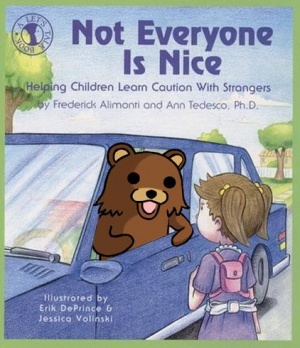Debate Guide: "Stranger danger" or "It could be anyone": Difference between revisions
No edit summary |
The Admins (talk | contribs) mNo edit summary |
||
| Line 15: | Line 15: | ||
Firstly, the statistics actually indicate that families are by far the biggest "threat" to the welfare of their children. In this sense, it would be more viable to distrust oneself, but for the fact that these higher rates are probably exposure-related. There is no workable way of protecting children from such rare threats, and what little "positive" impact superficially rational provisions may have, the result is likely to be fearful, physically non-receptive children, fearful, physically non-receptive society and all the wider political and psychological problems that this brings. | Firstly, the statistics actually indicate that families are by far the biggest "threat" to the welfare of their children. In this sense, it would be more viable to distrust oneself, but for the fact that these higher rates are probably exposure-related. There is no workable way of protecting children from such rare threats, and what little "positive" impact superficially rational provisions may have, the result is likely to be fearful, physically non-receptive children, fearful, physically non-receptive society and all the wider political and psychological problems that this brings. | ||
There are also [[SOR|registries]] and other provisions in some countries that allow people to identify offenders. These cause serious problems in and of themselves. | There are also [[SOR|registries]] and other provisions in some countries that allow people to identify offenders. These cause serious [[SOR problems|problems]] in and of themselves. | ||
[[Category:Debate]][[Category:Debating Points: Sociological]][[Category:Debating Points: Adults]][[Category:Debating Points: Child/Minor]][[Category:Debating Points: Adult-Minor sex]] | [[Category:Debate]][[Category:Debating Points: Sociological]][[Category:Debating Points: Adults]][[Category:Debating Points: Child/Minor]][[Category:Debating Points: Adult-Minor sex]] | ||
Revision as of 03:14, 27 March 2009
NewgonWiki: Call for input!
|

The first myth, although still very potent, is slowly being replaced with the second.
- "Protecting a child against sexual predators is a matter of constant vigilance in every public place. Children are only safe in our homes".
Assuming that each act involving the "sexualisation" of a child or minor is an abomination, this assumption is still misguided. Quite a large majority of reported cases involve someone who is known to the child or minor, with their own family being the main "threat". Any reputable source of criminal data can back this up.
It is much more likely that a child will be killed or seriously injured by a motorcar than killed or seriously injured by an abductor.
- "Absolutely no one can be trusted with our children. The offenders are everywhere, and we have no way of distinguishing them from safer individuals".
This newer myth is even more dangerous and flawed. It appears that both have been abused by governments and news agencies to incite fear in society.
Firstly, the statistics actually indicate that families are by far the biggest "threat" to the welfare of their children. In this sense, it would be more viable to distrust oneself, but for the fact that these higher rates are probably exposure-related. There is no workable way of protecting children from such rare threats, and what little "positive" impact superficially rational provisions may have, the result is likely to be fearful, physically non-receptive children, fearful, physically non-receptive society and all the wider political and psychological problems that this brings.
There are also registries and other provisions in some countries that allow people to identify offenders. These cause serious problems in and of themselves.